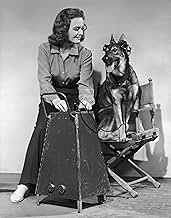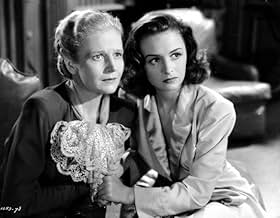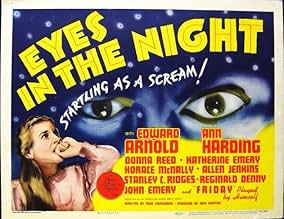VALUTAZIONE IMDb
6,7/10
2118
LA TUA VALUTAZIONE
Un detective cieco e il suo cane indagano su un omicidio e scoprono un complotto nazista.Un detective cieco e il suo cane indagano su un omicidio e scoprono un complotto nazista.Un detective cieco e il suo cane indagano su un omicidio e scoprono un complotto nazista.
- Regia
- Sceneggiatura
- Star
Stephen McNally
- Gabriel Hoffman
- (as Horace McNally)
Stanley Ridges
- Hansen
- (as Stanley C. Ridges)
Rosemary DeCamp
- Vera Hoffman
- (as Rosemary de Camp)
Steven Geray
- Anderson
- (as Steve Geray)
John Butler
- Taxicab Driver
- (non citato nei titoli originali)
Edward Kilroy
- Pilot
- (non citato nei titoli originali)
Recensioni in evidenza
What a gem of a movie! A blind detective, a Nazi plot and the smartest dog I've ever seen all make this a very enjoyable mystery/thriller. Young Donna Reed really is stunning and Mr. Arnold nails it as the blind detective. Great acting all the way around and some plot twists keep you watching. Enjoy it.
I'd never heard of this film, but discovered it bundled in with a lot of other 30s/40s B-movies in the "Mystery Classics" collection from Platinum Video. It's a surprisingly good film, really a near-great film that's hobbled a bit by it's middle act.
The first part of the film is really the only part that's a straight-forward detective romp, w/ a blind detective and his seeing-eye-dog and his hired muscle simpleton helping him sleuth out a fairly typical wrongfully-accused-murder plot. This part of the film is all golden, partially, I think, because the Detective's characters (All intended to be recurring characters in an ongoing film franchise that never quite got off the ground after this really good first chapter) feel like they have a past together, they feel like they know who they are, which is unusual for a potboiler of this era.
The second act resolves the murder a bit too quickly - in fact, it's never exactly resolved, the film merely abruptly changes focus from the detective et al to the murderers themselves discussing why they did it. This robs the film of most of it's dramatic strength, and essentially the middle act becomes little more than filler. It's entertaining enough filler - a sort of World War II version of "Wait Until Dark" - but it doesn't really advance the plot much.
The third act is the somewhat-rushed climax/resolution, though it features an unexpectedly cool shootout filmed in a very unusual style, and extended sequence with the detective's amazingly-well-trained dog. (Seriously, this dog is great! He could easily do his own taxes. He makes any other trained film dog - and really most trained film monkeys - look like idiots by comparison). On the whole, the film ends well, but it never fully recovers the momentum it lost by shifting focus in the middle, and as a result the final wrap up just comes across as slightly unsatisfying. It is, however, a more than satisfying introduction to what no doubt would have been a great detective series which, sadly, never really took off. I'm very surprised the concept was never revisited on TV or Radio, since the central character is endlessly entertaining.
One odd note: the ending feels a bit truncated, with some of the action happening off-camera. For instance, early on one of the bad guys is captured and held by the detective's men. Later on, we're shown the detective's men bound and gagged, the bad guy having evidently escaped. Later the bad guy reunites with his own people, but the transition is so abrupt that it feels like we're missing a scene or two. Also, there's a subplot in which the bad guys are hiding family information from one of their own people. This sets up what is obviously intended to be a major plot point, but, in the end absolutely nothing comes of it. Again, is this a missing scene, or simply bad writing? I can't tell.
Still and all, this is a near-classic film with a great character and some fantastic performances that unfortunately hobbles itself. Well worth a viewing, however.
The first part of the film is really the only part that's a straight-forward detective romp, w/ a blind detective and his seeing-eye-dog and his hired muscle simpleton helping him sleuth out a fairly typical wrongfully-accused-murder plot. This part of the film is all golden, partially, I think, because the Detective's characters (All intended to be recurring characters in an ongoing film franchise that never quite got off the ground after this really good first chapter) feel like they have a past together, they feel like they know who they are, which is unusual for a potboiler of this era.
The second act resolves the murder a bit too quickly - in fact, it's never exactly resolved, the film merely abruptly changes focus from the detective et al to the murderers themselves discussing why they did it. This robs the film of most of it's dramatic strength, and essentially the middle act becomes little more than filler. It's entertaining enough filler - a sort of World War II version of "Wait Until Dark" - but it doesn't really advance the plot much.
The third act is the somewhat-rushed climax/resolution, though it features an unexpectedly cool shootout filmed in a very unusual style, and extended sequence with the detective's amazingly-well-trained dog. (Seriously, this dog is great! He could easily do his own taxes. He makes any other trained film dog - and really most trained film monkeys - look like idiots by comparison). On the whole, the film ends well, but it never fully recovers the momentum it lost by shifting focus in the middle, and as a result the final wrap up just comes across as slightly unsatisfying. It is, however, a more than satisfying introduction to what no doubt would have been a great detective series which, sadly, never really took off. I'm very surprised the concept was never revisited on TV or Radio, since the central character is endlessly entertaining.
One odd note: the ending feels a bit truncated, with some of the action happening off-camera. For instance, early on one of the bad guys is captured and held by the detective's men. Later on, we're shown the detective's men bound and gagged, the bad guy having evidently escaped. Later the bad guy reunites with his own people, but the transition is so abrupt that it feels like we're missing a scene or two. Also, there's a subplot in which the bad guys are hiding family information from one of their own people. This sets up what is obviously intended to be a major plot point, but, in the end absolutely nothing comes of it. Again, is this a missing scene, or simply bad writing? I can't tell.
Still and all, this is a near-classic film with a great character and some fantastic performances that unfortunately hobbles itself. Well worth a viewing, however.
Sure, it's pat and simplistic in places and the plot's a little daffy, but it has three major things going for it: an amazing dog named Friday, a delightful performance from veteran Edward Arnold and fine direction by Fred Zinnemann. It could've easily been filler, but Zinnemann has too much respect for his craft and the material to allow that to happen.
As others have pointed out, that dog really is something and nearly steals the show but Arnold is every bit as good. He is particularly amusing in his role within a role where he pretends to be an eccentric, ill-tempered uncle in order to foil the bad guys' dastardly scheme. (And that scheme is a big time McGuffin, no more than an obviously slight excuse to get all the conflicting characters under one roof.) Arnold's Cat & Mouse games with main villains Katherine Emery (resembling Mercedes McCambridge both in looks and delivery) and over-educated "butler" Stanley Ridges are tense and clever.
Zinnemann really shines in one ingenious scene set in a pitch dark basement. Arnold, playing a super smart blind sleuth growls "In the dark! In my kingdom now!" and proceeds to outwit a trigger happy thug. Not unlike the Coen brothers' "Blood Simple" 45 years later, the only light is provided by a number of randomly fired gunshots. Not surprisingly, this technique is effectively taut and unnerving. If you weren't aware who the director was at that point, it's the sort of thing that makes you go running to your film guide thinking "Whoa. Who directed this?"
As others have pointed out, that dog really is something and nearly steals the show but Arnold is every bit as good. He is particularly amusing in his role within a role where he pretends to be an eccentric, ill-tempered uncle in order to foil the bad guys' dastardly scheme. (And that scheme is a big time McGuffin, no more than an obviously slight excuse to get all the conflicting characters under one roof.) Arnold's Cat & Mouse games with main villains Katherine Emery (resembling Mercedes McCambridge both in looks and delivery) and over-educated "butler" Stanley Ridges are tense and clever.
Zinnemann really shines in one ingenious scene set in a pitch dark basement. Arnold, playing a super smart blind sleuth growls "In the dark! In my kingdom now!" and proceeds to outwit a trigger happy thug. Not unlike the Coen brothers' "Blood Simple" 45 years later, the only light is provided by a number of randomly fired gunshots. Not surprisingly, this technique is effectively taut and unnerving. If you weren't aware who the director was at that point, it's the sort of thing that makes you go running to your film guide thinking "Whoa. Who directed this?"
Edward Arnold plays blind detective Duncan Maclain in "Eyes in the Night," a 1942 MGM film directed by Fred Zinnemann that has a lot of other familiar faces.
Ann Harding made her return to the screen after a few years in this small film, playing the stepmother, Norma Lawry, of a young actress, Barbara (Donna Reed at 21), who's fallen in love with an older actor with whom Harding was once involved.
Norma wants Mac to help her convince the actor it's best to steer clear of Barbara. Norma's husband is in Washington presenting a formula to the government that is critical to the war effort.
Unfortunately, the actor turns up dead, and Barbara sees not only his dead body, but her stepmother, when she arrives at the man's apartment. Norma goes running to Mac for help. He sets out to find the killer, and it leads him into a web of espionage.
Nice job by Zinnemann, who was just starting out, though he didn't like doing the film except for working with Ann Harding and Donna Reed. As others have mentioned, his pitch black gun battle with the only light coming from the fired shots is most effective and portends the great things to come from him. Overall, it's an okay story, well done.
Edward Arnold does an excellent job (though Zinnemann said he kept blowing his lines) as the smart and likable blind detective, who is aided by an assistant (Allen Jenkins) and his dog Friday, who looks to be a German shepherd mix.
Friday is unbelievable - what an actor and athlete! That dog had some training. Zimmemann didn't agree. Friday, who was descended from a silent dog star named Flash, apparently was only good for one take, becoming bored easily. In fact, Friday's only film appearances are in the two Duncan Maclain films.
Besides Reed, one can spot Rosemary DeCamp as Vera the maid, Stanley Ridges as the butler, Stephen McNally as Vera's husband Gabriel, Mantan Moreland as Mac's butler, and I honestly thought Katherine Emery WAS Mercedes MacCambridge. Wow! Even the speaking voice.
This was intended as a series for MGM, but the studio only made one other. Universal took the fat man detective series from the radio and made a film with J. Scott Smart with an early appearance by Rock Hudson directed by William Castle, but never followed it up. Nevertheless, there's something about these fat detectives, going back to Nero Wolfe, I guess, that's appealing.
Enjoyable. Glad Friday was able to keep his date after all.
Ann Harding made her return to the screen after a few years in this small film, playing the stepmother, Norma Lawry, of a young actress, Barbara (Donna Reed at 21), who's fallen in love with an older actor with whom Harding was once involved.
Norma wants Mac to help her convince the actor it's best to steer clear of Barbara. Norma's husband is in Washington presenting a formula to the government that is critical to the war effort.
Unfortunately, the actor turns up dead, and Barbara sees not only his dead body, but her stepmother, when she arrives at the man's apartment. Norma goes running to Mac for help. He sets out to find the killer, and it leads him into a web of espionage.
Nice job by Zinnemann, who was just starting out, though he didn't like doing the film except for working with Ann Harding and Donna Reed. As others have mentioned, his pitch black gun battle with the only light coming from the fired shots is most effective and portends the great things to come from him. Overall, it's an okay story, well done.
Edward Arnold does an excellent job (though Zinnemann said he kept blowing his lines) as the smart and likable blind detective, who is aided by an assistant (Allen Jenkins) and his dog Friday, who looks to be a German shepherd mix.
Friday is unbelievable - what an actor and athlete! That dog had some training. Zimmemann didn't agree. Friday, who was descended from a silent dog star named Flash, apparently was only good for one take, becoming bored easily. In fact, Friday's only film appearances are in the two Duncan Maclain films.
Besides Reed, one can spot Rosemary DeCamp as Vera the maid, Stanley Ridges as the butler, Stephen McNally as Vera's husband Gabriel, Mantan Moreland as Mac's butler, and I honestly thought Katherine Emery WAS Mercedes MacCambridge. Wow! Even the speaking voice.
This was intended as a series for MGM, but the studio only made one other. Universal took the fat man detective series from the radio and made a film with J. Scott Smart with an early appearance by Rock Hudson directed by William Castle, but never followed it up. Nevertheless, there's something about these fat detectives, going back to Nero Wolfe, I guess, that's appealing.
Enjoyable. Glad Friday was able to keep his date after all.
If you're a dog lover like me, you'll find this one hard not to like! Good old "Friday" steals this show-with some able assistance from a very keen and rugged blind man. I found this one easy to follow and it kept my interest all the way. A really neat mix of intrigue, mystery, and humor to boot. Oh...and some espionage thrown in as is per this era's thematics. The gal who plays the enemy is quite wicked!
This is a murder mystery that will get you smiling! A fun and easy frolic minus a tangled plot that uses all the "senses". Oh, and a young Donna Reed.......not bad at all. This one makes Rin Tin Tin and Lassie look like amateurs!
This is a murder mystery that will get you smiling! A fun and easy frolic minus a tangled plot that uses all the "senses". Oh, and a young Donna Reed.......not bad at all. This one makes Rin Tin Tin and Lassie look like amateurs!
Lo sapevi?
- QuizThe first film in what was meant to be to be a mystery franchise focused on blind detective Duncan Maclain who solved murders with the help of his seeing eye dog, Friday. When the second entry, The Hidden Eye (1945), failed to elicit sufficient interest, MGM ended the series.
- BlooperWhen the butler/enemy agent Hansen confronts Duncan MacLean loudly playing the organ in the middle of the night, Hansen ruffles his own hair to appear as if he has been sleeping and just awakened - clearly forgetting that MacLean cannot see his appearance.
- Curiosità sui creditiFriday appears as himself.
- Versioni alternativeThere is now a colorized version available. Highly recommended as much of the film is set in the dark which doesn't register well in the b&w original.
- ConnessioniFeatured in Personalities (1942)
I più visti
Accedi per valutare e creare un elenco di titoli salvati per ottenere consigli personalizzati
- How long is Eyes in the Night?Powered by Alexa
Dettagli
Botteghino
- Budget
- 433.000 USD (previsto)
- Tempo di esecuzione
- 1h 20min(80 min)
- Colore
- Proporzioni
- 1.37 : 1
Contribuisci a questa pagina
Suggerisci una modifica o aggiungi i contenuti mancanti
































